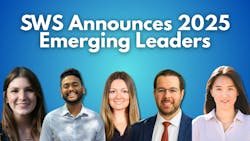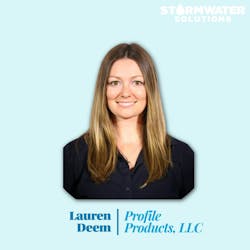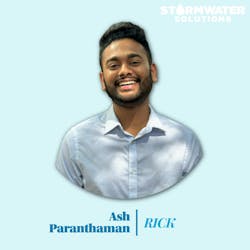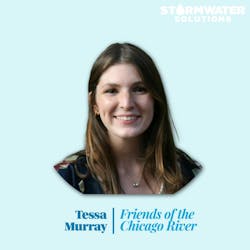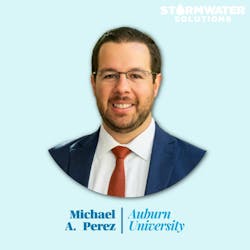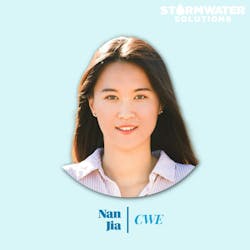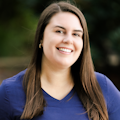Rising to the occasion: SWS announces 2025 Emerging Leaders
This year’s class of Emerging Leaders span careers in technical services to education.
Each year, SWS recognizes a group of young professionals, and while we rebranded the program to Emerging Leaders this year, the idea is the same as years past. The program seeks to recognize rising stars in the industry, and this year is no exception. This year’s class ranges in profession and expertise, but they are all poised to lead the stormwater industry into its next generation. Below, meet our five 2025 Emerging Leaders.
Lauren Deem
Technical Services Manager
Profile Products, LLC
What are your professional certifications and education?
- B.S. in Environmental Science from Allegheny College in PA.
- M.S. in Natural Resources and Environmental Management from the University of Hawai´i at Mānoa.
- Certified Erosion, Sediment, and Stormwater Inspector (CESSWI) since 2022.
- Certified Professional in Erosion and Sediment Control (CPESC) since 2023.
What are your professional accomplishments?
I am the International Erosion Control Association (IECA) state representative for Mississippi, and I was named a 2024 Emerging Leader for IECA. I was also honored to be nominated and attend the Emerging Leaders Alliance conference last year.
How did you come to be in the water industry?
My background was primarily soils through undergrad and graduate school and my first job after earning my masters was in an agricultural soils lab. Profile Products found me on LinkedIn and from there I became immersed in the erosion control world. A key part of controlling erosion is understanding water and its patterns.
What are your goals?
My focus is learning more about the erosion control industry and the different technologies and how to best apply them to different projects. I also have been working with various state departments of transportation and helping them create robust specifications for different erosion control product categories.
What are your hobbies outside of work?
I enjoy going to the gym, hiking, kayaking, going to the beach, reading, and trying to not kill my house plants or my sourdough starter, Frodough Baggins.
What is a fun/surprising fact about you?
I play right wing in a co-ed ice hockey league.
What piece of media (books, TV shows, movies, games, podcasts, etc.) has had the greatest impact on you in the past 12 months?
The Death and Life of the Great Lakes – a nonfiction book by Dan Egan. It really highlights ecological challenges facing lakes that contain 20% of our surface fresh water and how important and difficult it can be to manage these resources.
Are you involved in the community outside of work? If so, how?
I recently moved states, so I’m still working on getting involved locally, but I led our business unit’s inaugural community impact week efforts recently, which included raising money for the Surfrider Foundation and the National Forest Foundation.
What is your biggest lesson learned so far?
Make sure you know basic unit conversions before taking the CPESC exam.
What do you think is the most pressing issue facing the stormwater industry and how can we work to overcome it?
With changing climate and more extreme weather events, stormwater infrastructure is going to be crucial. It’s important we understand and design for what we anticipate the various X-year flood events to actually look like with changing precipitation, rather than what is currently on record.
Ash Paranthaman
Associate Project Engineer/Manager
RICK
What are your professional certifications and education?
I have a MS in Environmental Engineering from University of California, Irvine and a BE in Civil Engineering from Anna University, India. I am also a Licensed Professional Engineer in California and Colorado.
What are your professional accomplishments?
At just 28, I became the youngest project engineer/manager at RICK — a milestone that reflects my dedication, rapid growth and commitment to excellence within the industry, achieving this promotion with only five years of experience at that time. I bring extensive stormwater consulting experience across the private, municipal, county, state, and federal sectors, managing projects of all scales — from small initiatives to multimillion-dollar developments — throughout California, Colorado and Utah. I've worked on several City of San Diego Stormwater Emergency Projects, playing a key role in protecting critical infrastructure during high-priority, time-sensitive events. Additionally, I’ve served as the lead water resources engineer on multiple award-winning projects recognized by APWA, ASCE, and ACEC.
How did you come to be in the water industry?
While pursuing my undergraduate degree in civil engineering, I quickly realized that structural and geotechnical engineering weren’t the right fit for me. Drawing bending-moment and shear force diagrams just didn’t resonate. In search of my path in civil engineering, I explored various electives and eventually discovered water resources engineering. It felt like finding the final piece of a 1,000-piece puzzle. From that moment on, I was all in. Water just made sense to me almost intuitively and it has been my passion ever since.
What are your goals?
My goal is to continue to learn and grow as a stormwater expert, contributing to innovative and effective solutions that protect and improve critical stormwater infrastructure. I’m committed to staying at the forefront of the industry and making a lasting impact through my work.
What are your hobbies outside of work?
I'm an amateur photographer with a passion for hiking and camping in the great outdoors. I'm also a car enthusiast who loves tinkering with my car, and I'm an avid Formula 1 fan.
What is a fun/surprising fact about you?
I've visited 44 out of the 63 U.S. National Parks, and one of my lifelong goals is to visit them all.
What piece of media (books, TV shows, movies, games, podcasts, etc.) has had the greatest impact on you in the past 12 months?
While books, movies and podcasts have certainly been impactful, the most influential experience for me this year has been participating in a mentorship program. Having the opportunity to learn directly from a seasoned industry professional has offered invaluable insights and perspectives that have deeply shaped my growth, both personally and professionally.
Are you involved in the community outside of work? If so, how?
I recently got elected as the vice president of community service for the ASCE San Diego Section’s Younger Member Forum. I am also pretty involved in the APWA San Diego Chapter’s Young Professionals Committee and the Stormwater Committee.
What is your biggest lesson learned so far?
Everything happens for a reason. You can’t connect the dots looking forward. You can only connect them looking backwards. So, trust the process.
What do you think is the most pressing issue facing the stormwater industry and how can we work to overcome it?
One of the biggest challenges facing the stormwater industry is aging infrastructure. Many local municipalities are struggling to maintain, repair and replace their existing systems in a timely manner. To effectively address this issue, municipalities need dedicated and reliable stormwater-specific funding, not only to tackle aging infrastructure but also to ensure long-term operation and maintenance at a watershed scale.
Tessa Murray
Watershed Policy Manager
Friends of the Chicago River
What are your professional certifications and education?
I hold a bachelor's degree in environmental science from McGill University and am currently a Master of Public Administration candidate at Northern Illinois University. I am also a Certified Public Health Entomologist through the Midwest Center of Vector-Borne Diseases.
What are your professional accomplishments?
Since joining Friends of the Chicago River a year and a half ago, I have led the expansion of the Greater Chicago Watershed Alliance, doubling its membership and broadening representation to include a diverse range of voices in regional watershed management. My key policy contributions include advocating for the city of Chicago’s NPDES permit for combined sewer overflow discharges and coordinating stakeholder feedback on the Metropolitan Water Reclamation District’s Watershed Management Ordinance. I also led the 20th anniversary Chicago River Summit, which brought together more than 150 experts to advance regional watershed strategies. Previously, as sustainability coordinator for the Village of Northbrook, I spearheaded the passage of a Climate Action Plan, implemented a single-use bag tax, and led multiple native plant and rain garden initiatives to enhance local environmental resilience.
How did you come to be in the water industry?
I came to the water industry out of a deep concern for climate change and a desire to be part of the solution at the local level, where the impacts are more immediate and tangible. In my hometown of Chicago, climate change often shows up as extreme rainfall and flooding, which can damage homes, overwhelm infrastructure, and threaten public health. Water is such a powerful and cross-cutting piece of the climate puzzle that touches everything from health, infrastructure, equity, ecosystems and more.
What are your goals?
I see my future work continuing to center around local responses to climate change and making Chicagoland communities more resilient through advocacy and policy reform.
What are your hobbies outside of work?
I love spending time in nature and gardening, playing bar trivia with friends, and hanging out with my family and our dog, Mabel.
What is a fun/surprising fact about you?
I got to pet the Obama family’s dog once.
What piece of media (books, TV shows, movies, games, podcasts, etc.) has had the greatest impact on you in the past 12 months?
Werner Herzog’s Encounters at the End of the World.
Are you involved in the community outside of work? If so, how?
I'm an Openlands TreeKeeper, so I like helping out on volunteer days where we plant, prune and take care of the trees in my neighborhood and around the city.
What is your biggest lesson learned so far?
Keep asking questions.
What do you think is the most pressing issue facing the stormwater industry and how can we work to overcome it?
One of the most pressing issues facing the stormwater industry is the disconnect between where flooding happens and where investment flows. Too often, stormwater infrastructure decisions are based on outdated data or constrained by traditional engineering approaches that don’t center equity or community input. As climate change drives more frequent and intense storms, we need a shift toward proactive, place-based solutions that prioritize the communities most at risk, namely historically disinvested neighborhoods that have long borne the brunt of flooding.
Michael A. Perez, PhD, PE, CPESC
Brasfield & Gorrie Associate Professor
Auburn University
What are your professional certifications and education?
D., Civil Engineering – Auburn University; M.S., Civil Engineering – Auburn University; B.S. Civil Engineering – Florida State University; PE – Professional Engineer (Alabama); and CPESC – Certified Professional in Erosion and Sediment Control
What are your professional accomplishments?
I’ve had the opportunity to work on more than 30 research projects and publish more than 50 research papers aimed at improving stormwater quality. I serve as chair of the Transportation Research Board’s AKD50 Standing Committee on Hydrology, Hydraulics, and Stormwater.
How did you come to be in the water industry?
I had an internship in college where I got to work on coastal erosion projects for the Florida Park Service. I ended up really enjoying that work and found the opportunity to continue working on construction stormwater/erosion issues in graduate school. It has been stormwater ever since. I haven’t looked back.
What are your goals?
The work I do is focused on improving the way we manage stormwater. My goal is to make as much of an impact as I can in improving water quality. I do that by mentoring undergraduate and graduate students in stormwater research, helping develop new technologies and evaluating practices so that we can improve the way we design, install and maintain stormwater practices, and by leading training and workshops for stormwater professionals.
What are your hobbies outside of work?
I enjoy the outdoors and DIY’ing (woodworking, home remodeling, landscaping, 3d printing).
What is a fun/surprising fact about you?
I have got a very oversized (15 pound) Pomeranian.
Are you involved in the community outside of work? If so, how?
I am involved in the American Society of Civil Engineers (ASCE). I serve as the faculty advisor for Auburn’s student chapter. I find it to be very rewarding to mentor our student leaders and see them grow professionally while engaging their peers. The student chapter competes in an annual competition against 14 other universities in the Gulf Coast. They have done exceptionally well the last few years, earning top spots in the steel bridge, concrete canoe, and sustainability competitions.
What is your biggest lesson learned so far?
People don’t like change. I’m in a role where we embrace new ideas and innovation, but it can be difficult to get others to embrace new ideas when it creates a major change in the way they do their work.
What do you think is the most pressing issue facing the stormwater industry and how can we work to overcome it?
Stormwater continues to be a major contributor of pollutants into water bodies. Overcoming the challenge is going to take a shift in the way we manage stormwater runoff, and we’re going to need to rely on innovative practices and solutions to reduce the transport of pollutants.
Nan Jia
Engineer III
CWE
What are your professional certifications and education?
Master of Science in Civil and Environmental Engineering, UC Irvine; and PE, QSD/P
What are your professional accomplishments?
I am a mentor to over 10 peers and younger staff and provide guidance, support, and constructive feedback while fostering their professional growth and development in the civil engineering field. I have created Standard Operating Procedures for water sampling and reporting, data review, and project specific software and have assisted municipalities with developing inspection programs and conducting over 600 Industrial/Commercial inspections. I have led water quality studies, such as pollutant load analyses for runoff diversions and best management practice effectiveness studies for green street projects. As project manager for the Los Angeles County Public Works (LACPW) Multi-Benefit Project Operations & Maintenance Training Video Production project, I led the development of comprehensive training videos to create a project-specific library of training materials, aiding maintenance personnel in performing essential functions, evaluating water quality enhancements, and documenting activities for Municipal Separate Storm Sewer System (MS4) Permit compliance. My ability to synthesize observations and find innovative solutions is highlighted by the Orange County Public Works (OCPW) Newport Bay Watershed Fecal Coliform Total Maximum Daily Load (TMDL) Support project.
How did you come to be in the water industry?
I've always enjoyed water sports like scuba diving, swimming and paddleboarding. These experiences have inspired me to contribute to protecting water quality and preserving recreational opportunities for future generations.
What are your goals?
Lead a stormwater infrastructure project from concept to implementation.
What are your hobbies outside of work?
Dancing
What is a fun/surprising fact about you?
I have visited over 15 national parks and counting.
What piece of media (books, TV shows, movies, games, podcasts, etc.) has had the greatest impact on you in the past 12 months?
The Cove.
Are you involved in the community outside of work? If so, how?
I am involved with the Southern California Chinese-American Environmental Protection Association (SCCAEPA) and the American Educated Chinese Foundation (AEC) as a coach for their youth environment summer camp for the past three years. I coached a group of 10 – 20 students in grades 7 – 12 in the Surface Water Management section. This camp section focused on the hydrological cycle, stormwater quality and management, and green infrastructure implementation. I led lectures on the topics of surface water management, green infrastructure, and regional planning, and I guided students to complete their final group projects that identified stormwater capture and treatment opportunities to address water quality issues in the Newport Bay watershed.
What is your biggest lesson learned so far?
One of the most valuable lessons I’ve learned is the importance of approaching every project as a true partner to the client, not just a service provider. While consultants are often brought in for technical expertise, the most successful outcomes come when we’re fully engaged in a project as if we are part of our client’s internal team. This mindset shift allows us to anticipate the client's needs and offer potential solutions beyond simply meeting the scope requirements.
What do you think is the most pressing issue facing the stormwater industry and how can we work to overcome it?
There is always a lack of funding to implement stormwater infrastructure projects and fund ongoing operations and maintenance of storm drain systems and regional projects. We can advocate for a more long-term and sustainable funding source or seek grant funding, cost sharing partnership, or innovative ways to improve treatment efficiency and save costs.
About the Author
Alex Cossin
Associate Editor
Alex Cossin is the associate editor for Waterworld Magazine, Wastewater Digest and Stormwater Solutions, which compose the Endeavor Business Media Water Group. Cossin graduated from Kent State University in 2018 with a Bachelor of Science in Journalism. Cossin can be reached at [email protected].
Katie Johns
Katie Johns, editor-in-chief of Stormwater Solutions, graduated from the University of Missouri in 2016 with a Bachelor of Journalism and a Bachelor of Arts in Spanish. Johns joined the Stormwater Solutions team in September 2019. Johns also helps plan the annual StormCon conference and co-hosts the Talking Under Water podcast. Prior to entering the B2B industry, she worked as a newspaper reporter and editor in Sarasota, Florida, and a magazine assistant editor in the Chicago suburbs. She can be reached at [email protected].
